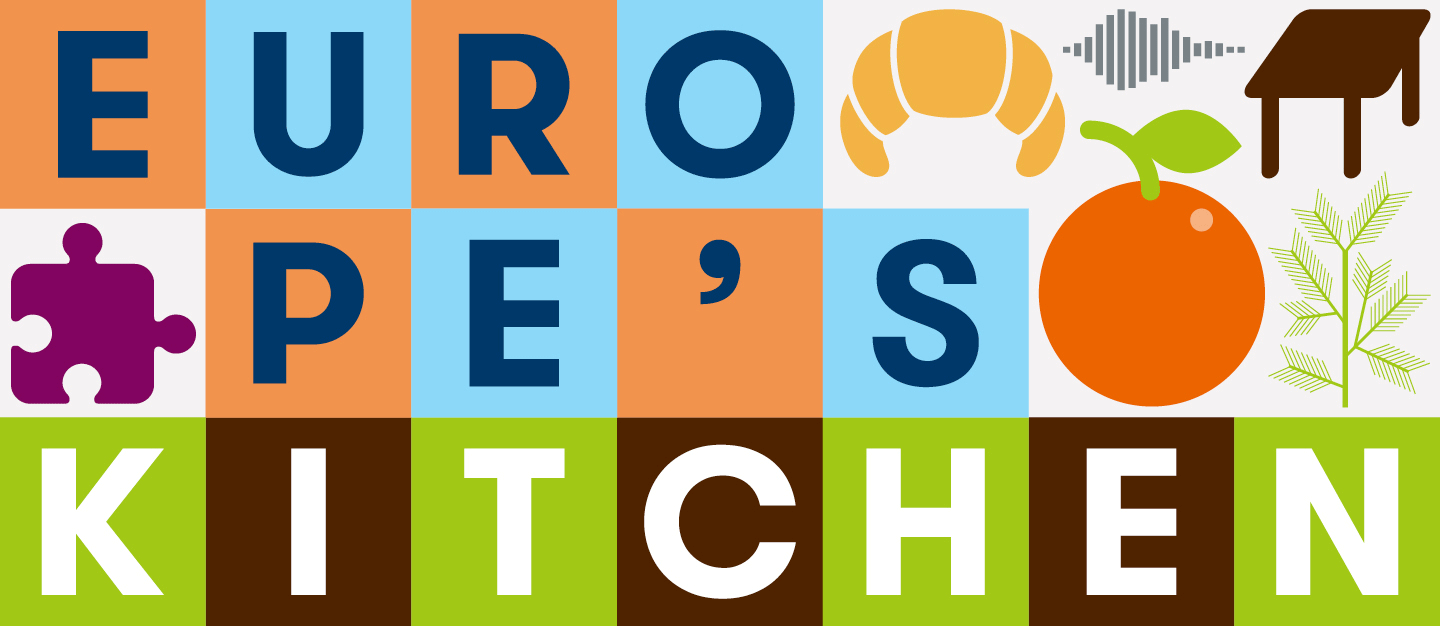Artists’ Perspectives on Europe
December 15, 2020, 6pm
How does Europe taste? 11 artists have been investigating this question in 11 European cities for the Goethe-Institut project Europe’s Kitchen. As part of Germany’s EU Council Presidency, they bring people of different nations and origins together at digital, physical, and metaphorical tables, not only to eat together, but to discuss hospitality, participation, and Europe. On December 15 from 6pm, all of the Europe’s Kitchen experiences will be brought together in a film premiere and subsequent discussion with, among others, Priya Basil, Mischa Leinkauf, Ivana Sajko, Patrícia Portela, and Arpad Dobriban.
The Goethe-Institut and Priya Basil, the project curator, invited eleven artists from various disciplines to each organize an event based on the idea of a kitchen chat—whether in the kitchens of private hosts, in public places, or in digital theatres. The artistic and discursive events revolved around central questions: What distinguishes Europe? Who is welcome and under what circumstances? And how can the European project be strengthened socially and culturally for the future? In eleven European cities, the artists and their guests sought ways to measure the success of the European project apart from economic dimensions and what connecting experiences Europeans can have besides economic and fiscal interests of the EU.
“Europe’s Kitchen aims to bring people together. It’s about sensuousness, it’s about sharing, about dialogue and about taking a different look at Europe; a look that’s critical and at the same time tries to find Europe’s best flavors. And that’s Europe’s Kitchen: a collective attempt to imagine and experience Europe differently,” curator Priya Basil explains her approach. For example, since meeting for dinner wasn’t possible, the Croatian dramaturge Ivana Sajko developed “exercises for gatherings” with a children’s theatre group. The German artist Mischa Leinkauf set up tables made of driftwood in the port city of Chania together with Cretan students in a contribution about participation. For three days the tables served as meeting places where people ate, drank, and discussed Europe together. Other stops by Europe’s Kitchen took place in Copenhagen, Tallinn, Wroclaw, Glasgow/Huntly, Palermo, Madrid, and Ljubljana.
On December 15 at 6pm, all the results of the artistic and culinary European tour will be brought together visually and discursively in an online closing event. In addition to a film premiere with impressions of all events, the audience can expect a discussion with some of the participating artists, including Priya Basil, Mischa Leinkauf and Ivana Sajko, Patrícia Portela, and Arpad Dobriban. The online event and an accompanying film documentary with impressions from the kitchen talks can be followed live at www.goethe.de/europakueche.
Overview of Europe’s Kitchen:
December 15: Digital closing event with Priya Basil, Ivana Sajko, Mischa Leinkauf, Patrícia Portela, Arpad Dobriban, and film documentary – Moderator: Shelly Kupferberg
December 4: Munich, Johny Pitts, moderator/author, UK
November 25: Ljubljana, Marinella Senatore, artist, Italy
November 21-22: Madrid, Arpad Dobriban, artist, Germany/Hungary
November 20: Palermo, Géraldine Schwarz journalist/author, France/Germany
November 15: Marseille, Ivana Sajko, dramaturge, Croatia
October 16-18: Glasgow, Jeannette Ehlers, video artist, Denmark
October 8-10: Chania, Mischa Leinkauf, artist, Germany
October 4: Wroclaw, Priya Basil, author, Germany/UK
September 25-27: Tallinn, Kateřina Šedá, concept artist, Czech Republic
August 15: Copenhagen, Patrícia Portela, performance artist, Portugal
More information: www.goethe.de/europakueche
The Goethe-Institut is the Federal Republic of Germany’s cultural institute, active worldwide. With 157 institutes in 98 countries, we promote the study of German abroad, encourage international cultural exchange, and convey a contemporary image of Germany. Through partnerships with institutions in numerous other locations, the Goethe-Institut has about 1,000 contact points worldwide. As a national and European cultural institute, the Goethe-Institut is committed to the vision of progressive European integration and with its activities continuously advocates further strengthening the values of the European Union: liberty, equality, and openness. It operates 51 institutes in Europe.
Europe’s Kitchen is a project by the Goethe-Institut, supported with special funds from the Federal Foreign Office for Germany’s EU Council Presidency in 2020.


